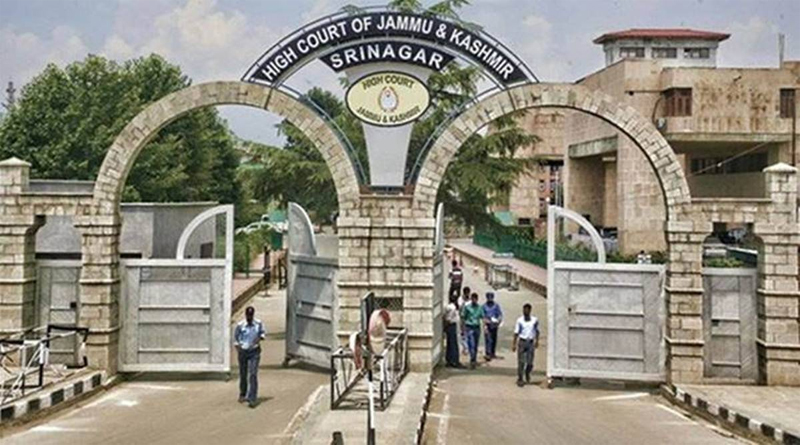Excelsior Correspondent
JAMMU, Aug 22: High Court today held that Judges can’t overstep defined jurisdiction and expose administration of justice to individualistic whims and fancies.
High Court also ruled that Sections 107 and 108 read with Order 43 Rule 2 CPC don’t empower an appellate court to mutate the very script of the suit before the trial court and create a new fact situation and proceed on to carry forward its own perception-based outcome to a given civil suit.
Justice Rahul Bharti, while hearing a plea under Article 227 and the moot question that had fallen for adjudication was as to whether an appellate court can, in purported exercise of its jurisdiction under Order 43 Rule 1(r) CPC, sidestep main cause of a civil suit and the appealable order passed therein and self-generate a new situation to deal with.
The facts of the case is that the petitioner, as being the plaintiff, filed a civil suit on 21st April 2022 before the Court of Sub Judge, Anantnag for seeking a decree of declaration and injunction. The petitioner’s right to sue related to his purported status as being the President of the Municipal Committee, Bijbehara. The sole defendant named in the suit is Executive Officer, Municipal Executive Committee, Bijbehara, Anantnag.
The purported cause of action for the petitioner to file the suit was the issuance of a notice dated 20th April 2022 by the defendant Executive Officer for the purpose of convening a special meeting under Rule 27 of the Procedure & Business with respect to a purported resolution for motion of no-confidence alleged to be signed by nine out of sixteen elected members of the Municipal Committee, Bijbehara.
The trial court of Sub Judge, Anantnag, vide its order dated 21st April 2022 came to stay, ad interim, the operation of the communication of the defendant Executive Officer, Municipal Executive Committee, Bijbehara read with the resolution bearing no-confidence. The respondents in their written statement stated that it was only upon the failure of the petitioner to act in convening the meeting for fresh election that the original defendant Executive Officer, Municipal Executive Committee Bijbehara, had stepped in, by compulsion of statutory provisions.
After hearing both the parties the Sub Judge Anantnag passed a final order dated 26th May 2022 thereby dismissing the temporary injunction application of the petitioner, and also vacating the interim direction of stay of the communication, with a further direction to the Executive Officer Municipal Executive Committee, Bijbehara, to exercise the process of no-confidence motion strictly in terms of the provisions of the Municipal Act, 2000.
This order came to be challenged in an appeal before the lower appellate court of the Additional District Judge, Anantnag who called for the official record from the office of the Municipal Committee, Bijbehara and made both the petitioner and the respondents to undertake a fresh process & exercise for resolution/motion of no-confidence.
The Additional District Judge, Anantnag passed a 30-page impugned judgment dated 20/07/2022 bearing a declaration that the petitioner has lost majority in the Municipal Committee Bijbehara and has no right to hold the office of the President.
Justice Rahul Bharti observed, “instead of disposal of appeal as warranted under law the court of Additional District Judge, Anantnag allowed itself a distraction and take a detour. The Additional District Judge in fact “abandoned” the exercise of examining the submissions so made by the parties on the merits of the case in appeal and examining the trial court order, and resorted to become “self-imposed” supervisory authority of the Municipal Committee, Bijbehara”.
Expressing its displeasure, Justice Rahul Bharti recorded that a serving Judicial Officer, paid by the litigants, came to be placed in service of the litigants by the Additional District Judge, Anantnag without bothering to mention it on record as to under which provision of the CPC and the Civil Courts Act, 1977 such a venture was contemplated and carried out and by which authority in and of law a Sub-Judge was commanded to act as supervisor in the internal political matters of a Municipal Committee.
High Court also frowned on the judgment delivered by the Additional District Judge bearing a declaration that the petitioner has lost majority in the Municipal Committee Bijbehara and has no right to hold the office of the President, and then passing on a writ like directive to the Executive Officer, Municipal Committee Bijbehara to proceed as per Jammu & Kashmir Municipality Rules.
Justice Rahul Bharti observed that the impugned order and the proceedings related with and to the passing of the order of the court of Additional District Judge, Anantnag were set at naught by holding the same as null and void ab initio and directed the District Judge, Anantnag to recall the appeal from the court of Additional District Judge, Anantnag with an additional direction to hear and adjudicate it by himself within 30 days from the date of receipt of copy of this judgment.
High Court also directed that the Principal District Judge, Anantnag shall call upon the Sub Judge (Secretary DLSA) Anantnag to remit the fee of Rs 20,000 if received from and paid by the respondents and the same shall then be returned to the respondents against receipt.


